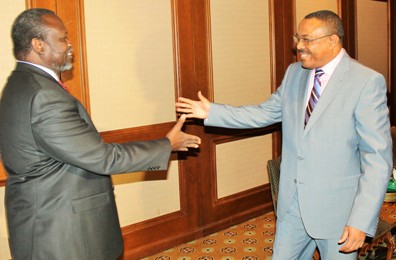SPLM-IO calls on IGAD, Troika to help reverse unilateral creation of 28 states in South Sudan
November 26, 2015 (ADDIS ABABA) – South Sudan’s armed opposition faction (SPLM-IO) under the leadership of the first vice-president designate, Riek Machar, has called on the regional mediation, IGAD, and its international partners including Troika countries of the United States, Norway and the United Kingdom, to put “meaningful” pressure on president Salva Kiir to reverse his unilateral decision of creating unconstitutional 28 states in violation of the peace agreement signed in August by the parties to the 21-month long conflict.

“How will we form a transitional government of national unity when president Kiir’s regime has been instead eroding the very basis for formation of the transitional government?” said James Gatdet Dak, spokesman for Machar, when contacted by Sudan Tribune on Thursday.
“IGAD, Troika and the United Nations should help in putting meaningful pressure on president Kiir to revoke his unconstitutional decision of creating 28 states which is a clear violation of the peace agreement,” he said.
Dak was reacting to the calls by the international community, particularly the Troika countries, telling the warring parties to form a transitional government of national unity “now” and for all the representatives of the parties to take part in the first meeting of the Joint Monitoring and Evaluation Commission (JMEC) scheduled to take place in the South Sudanese national capital, Juba, on Friday, 27 November.
The opposition leader’s spokesman said his leadership and the entire movement had been for peace, adding this was the reason their leadership was the first to sign the peace agreement on 17 August without holding on to any reservations in the accord.
He however said president Kiir who signed with the reservations nine days later on 26 August has been working to derail the implementation of the peace agreement by attempting to unilaterally amend the peace agreement and the transitional constitution in violation of the mechanisms provided for in the peace deal in order to do so collectively by the parties to the agreement.
The peace agreement was signed on the basis of the current 10 states, he said, and that it provided for a transitional amendment committee from the parties to the agreement to amend the current transitional constitution which would then be endorsed by the future transitional parliament with membership of all the parties under a unity government, and not singly by the current parliament.
The agreement also provided for permanent constitutional making process in which the issue of governance, particularly federalism and creation of more states will be tackled.
Dak challenged that the international community seemed to have failed to force president Kiir to reverse his violations despite the fact that Troika and others condemned his actions as violations of the peace agreement and the constitution.
He said forming a unity government without an agreed basis would unravel in days, adding it was important to first tackle president Kiir’s violations.
“We think the issue is not formation of the transitional government for the sake of it. This has to be based on the peace agreement which president Kiir has unfortunately already violated,” he said.
Currently, he explained, the country has no constitutional states because the parliament in Juba had last week scrapped the constitutional provision of the 10 states and currently hanging to try to insert 28 states or so illegally.
He also said the 28 states are a recipe for another war as some sections of the South Sudanese society, such as the Shilluk community, have already started to fight in resisting the presidential order which takes away some of their ancestral lands and giving them to their neighbouring Dinka community of Apadang.
The government, he further claimed, has also continued to attack their bases in Unity, Jonglei and Western Equatoria states, with the latest being the government’s air raids on the opposition designated cantonment area in Mundri county of Western Equatoria state on Tuesday and the shelling of Pajut area in Uror county of Jonglei state on Thursday.
Dak insisted that the international community should instead ensure that this “problematic trend” taken by president Kiir is reversed before they could speak of forming a transitional government.
He however reiterated that the opposition faction was committed to the peace agreement and had made their advance team ready to travel to Juba for the implementation of the deal should president Kiir stop undermining the agreement.
No advance team will go to Juba until the matter was addressed, he said.
He further added that there was need for IGAD and its international partners to summon president Kiir in order to explain his violations and reverse them so as to save the peace agreement.
(ST)
